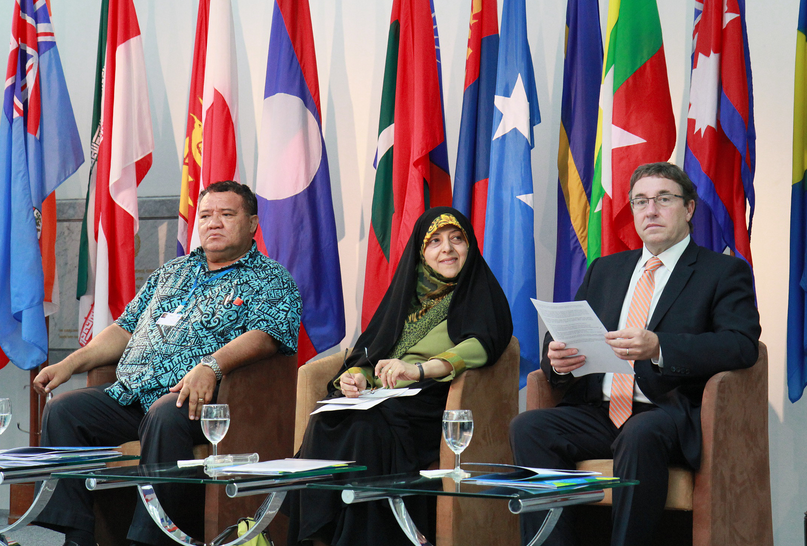High-level representatives of 33 countries of the Asia-Pacific region put forward recommendations for consideration at the next session of the UN Environment Assembly (UNEA 2).
The representatives highlighted that particular challenges for the region include air pollution and its health impacts, the need for sound chemicals and waste management, including transboundary approaches, and promotion of the green and blue economy.
 20 May 2015: High-level representatives of 33 countries of the Asia-Pacific region put forward recommendations for consideration at the next session of the UN Environment Assembly (UNEA 2). The representatives highlighted that particular challenges for the region include air pollution and its health impacts, the need for sound chemicals and waste management, including transboundary approaches, and promotion of the green and blue economy.
20 May 2015: High-level representatives of 33 countries of the Asia-Pacific region put forward recommendations for consideration at the next session of the UN Environment Assembly (UNEA 2). The representatives highlighted that particular challenges for the region include air pollution and its health impacts, the need for sound chemicals and waste management, including transboundary approaches, and promotion of the green and blue economy.
The First Forum of Ministers and Environment Authorities of Asia Pacific took place from 19-20 May 2015, in Bangkok, Thailand, organized by the UN Environment Programme (UNEP). It consisted of panel discussions and interventions on: the post-2015 sustainable development agenda, Sustainable Development Goals (SDGs) and environmental sustainable in the Asia-Pacific; the environmental outlook for the region; environment and health linkages in the region; and input to UNEP’s Medium-Term Strategy 2018-2021.
Civil society representatives shared messages from the Asia-Pacific Civil Society Forum on Sustainable Development, which had taken place on 16-18 May. They called for: direct participation in the regional Forum based on established UNEP practices; self-organization for civil society’s contributions to the Forum; an inclusive, transparent, action-oriented and forward-looking Forum; translating linkages between environmental and human wellbeing into development programmes; reform of unjust laws and policies; reflecting gender equality and human rights in regional and international agreements; and linking the Forum to the Asia Pacific Forum on Sustainable Development (APFSD) to ensure synergy between the two mechanisms.
The Forum also included: a ministerial handover of the UNEP publication, titled ‘Indicators for a Resource-Efficient and Green Asia and the Pacific,’ a lunch event on ‘Asia Pacific and Climate Change,’ and the inaugural Asia Environmental Enforcement Award ceremony, organized by UNEP and Freeland.
The First Forum was organized as a response to a decision of the 2012 UN Conference on Sustainable Development (Rio+20), which called for strengthening UNEP’s regional presence in order to assist countries, upon request, in the implementation of their national environmental policies. The Forum replaces the Subregional Environmental Policy Dialogue organized by UNEP since 2003. Participants recommended holding the Forum every other year, in the year that UNEA does not convene.
The First Forum was immediately followed by the Asia Pacific Roundtable on Environmental Rule of Law in Support to the Post-2015 Development Agenda, which highlighted challenges for small economies that are highly dependent on ecological resources, and emphasized that green strategies must be implemented “with passion” and protected by the rule of law, according to Tshering Wangchuk, Chief Justice of Bhutan. [IISD RS Meeting Coverage]